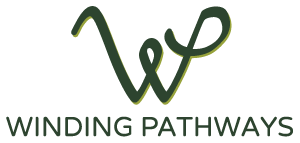by Winding Pathways | Oct 10, 2019 | Nature, Travel/Columns
Guest Blogger Paula Lelansky
My husband and I recently returned from an Alaskan vacation. This is a beautiful place to add to your bucket list! One of the first things I noticed was the clean, fresh air, and then the seemingly unspoiled beauty of Alaska! No matter where we were – in town, the forest or at Denali. The views were breathtaking. Traveling through Denali National Park, we were able to see that “the mountain was out.” This is the locals’ term for being able to see Mt. Denali in all its splendor without cloud cover.
Traveling the White Pass trail to the Summit, blazed by workers in the late 1800s, we marveled at the harsh conditions with which they must have dealt. Taking a kayak paddle near Hoonah, we watched a humpback whale right in front of us – spouting and breaching! We were saddened at seeing the devastation caused by the McKinley wildfire – one of three throughout Alaska this summer.
Sailing near Hubbard Glacier, with its beautiful hues of green and blue, we watched as it “calved” – a chunk of the Glacier falling off. Visiting at a dog sled camp and holding the puppies lifted our spirits! Taking a hike through the Tongass National Rainforest, the serene beauty took my breath away. We were enveloped by so much beautiful plant life in the forest. Fireweed, Devils Club and Horsetail, both with medicinal benefits, were abundant. Many different types of mosses, beautiful old towering hemlock and spruce trees, and muskegs (bogs) enchanted us. At a river, a black bear was attempting to catch salmon. After failing, she and her cub decided to follow the river downstream.
The experiences we had in Alaska will always stay with us. I’m ready to go back and spend more time exploring!
A mention about climate change. Due to the extremes in Alaska, climate change is most noticeable there. Glaciers and permafrost are melting rapidly. Hotter temperatures carry into the autumn. Unfortunately, logging in some areas is being considered. A warning to us all to be more mindful of how we live and use resources.
-
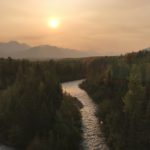
-
On train-land tour to Denali
-
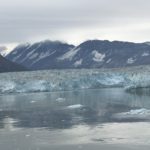
-
Captivating blue-green of the glacier
-
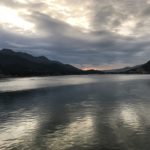
-
Sailing from Juneau to Skagway.
-
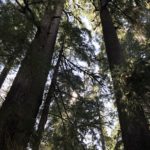
-
Ketchikan – Tongass Rainforest (20)
by Winding Pathways | Jul 25, 2019 | Gazette Features, Nature, Travel/Columns
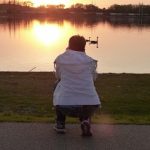
Capturing the sunset.
Iowa may be the flyover region of the country and people are missing out on grand adventures, pastoral scenes and tasty home-cooked meals. Come along with us as we explore the Driftless Area of Iowa, Minnesota, Wisconsin and Illinois. This invitation especially includes the Presidential Candidates! Get out and see our country! Read about our adventures in the Cedar Rapids Gazette.
by Winding Pathways | Jan 28, 2019 | Gazette Features, Travel/Columns
In December 2018 we spent a delightful two days in and around Pokagon State Park. It’s a great place to visit………..and scream like we did as we zipped down their famous toboggan run at nearly 40 miles an hour. Read about the Park and Steuben County in our travel feature that appeared in the Cedar Rapids GAZETTE on Sunday, January 27, 2019.
by Winding Pathways | Jan 24, 2019 | Labyrinths, Reflections/Profiles, Travel/Columns
What a tumultuous year!
Politics, weather extremes, human-created disasters, changes in work, working
through elder matters, untimely deaths. Wow. One could be overwhelmed and, using
an old New England phrase, think, “The world is going to H— in a Handbasket.”
Yet, when we shift the lens of our thinking and move into gratitude,
we begin to appreciate small pleasures and successes and help others move into
more positive places, so they contribute to gratitude and the healing of ourselves,
communities and the world.
So, here is a random selection from my 2018 Gratitude Jar.
Many gratitudes came from others helping me the many times Rich was East
helping his folks.
1-1 Walked the labyrinth two times and at the full moon in
the evening.
1-19 Facebook Live we talked about catalogs and treats for
the hens.
2-4 Working with Rich on Hoover Hatchery blog on chicken folklore.
3-25 We met a couple on Cedar Lake Train who feed birds and
noticed eagles.
4-27 Jenn helped me remember how to print PDF of Essential
Ed.
5-8 Dinner with the Ogden/Muchmore.
5-9 Voted.
5-24 A and D engaged!
6-25 Paige at Verizon helped with a discount.
6-27 Savannah helped again with household chores and sanding
the chairs. A really hot time and we did
it!
7-2 Taught with Mary Pathways at KCC.
8-22 Judy S. talked with students for KPACE.
9-1 Edith and Tami at Illuminations labyrinth walk.
10-4 Ellen’s hospitality for Veriditas Council.
second week October travel to Nebraska and South Dakota and meeting the “real Deal”ranchers.
11-27 DJ at the photo shop made great postcards for Winding
Pathways.
12-7 Norma and I had a wonderful talk after class.
12-13 Helped Rachel at PCI.
12-26 Walked North End labyrinth in Denville.
I enjoyed this walk down memory lane as I browsed the gratitude
notes and remembered the positives of 2018.
What’s the benefit? We infuse ourselves with a large DOSE
of optimism and improve our health and that of those around us.
Dopamine, the “chemical of reward”, flows into us
when we have accomplished a task and been kind to others. For me, completing tasks I especially do not
want to do has always proved to be helpful. Then, I write these on the
gratitude papers and slip them into my jar!
It’s best when I do the task first. Then, it is off my mind and I am
really pleased. Good habit to develop.
Oxytocin, the bonding hormone that parents especially
feel toward children, is released by gentle and caring touch. My work with Reiki,
Healing Touch Spiritual Ministries and facilitating programs creates
connections and stronger bonds among us.
Serotonin the neurotransmitter that counters
depression is often stimulated by sunshine, thinking positively, and eating
foods high in tryptophan. Pineapple, eggs, cheese, Tofu, salmon, nuts and
seeds, and, of course, turkey!
Endorphins produced in the central nervous system
help regulate pain. They can help us push through a difficult physical task. Some
form of daily movement helps us be more cheerful. Walking the labyrinth daily since late 2018
has benefitted me. Grounding. Centering. Naming specific gratitudes as I walk.
Appreciating the changes in the Phoenix Harmony Labyrinth.
Laughter
Online University has a great outlook on the neurotransmitters and hormones
that help lift us up. Then, we lift up others.
We create this better world most long for and which is badly needed.
So, let’s go positively into 2019!
by Winding Pathways | Nov 8, 2018 | Birds, Nature, Reflections/Profiles, Travel/Columns
A tiny migrating warbler changed my life. As I sat on my back deck a few springs ago a tiny bird landed on a twig about ten feet in front of me. I could see it singing but couldn’t hear a thing.
Military Training and Hearing Loss
My hearing loss probably started as an Army trainee in the late ‘60s guiding 50 caliber shells into a machine gun. Every time the gun spit a bullet downrange a massive blast of noise and pressure hit my skull. In later years I spent hours running chainsaws, vacuum cleaners, and lawn mowers. All to the detriment of my hearing.
Hearing loss is an insidious stealthy condition. It crept up on me so slowly and gradually that I never noticed it. My wife certainly knew something was going on as I increasingly asked her, and everyone else, to repeat sentences. Conversation in restaurants became challenging and tinnitus, or ringing in the ears, became my constant companion. Night and day my ears never stop buzzing.
Call to Action
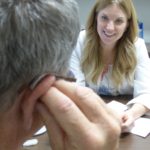
Fitting hearing aids is a process and building a relationship
Seeing, but not hearing, the warbler spurred me to call Dr. Jennifer Reekers at Heartland Hearing Center in Hiawatha, Iowa. Soon I was sitting opposite her in a hearing test booth that confirmed what I already Low-frequency sounds were easy to distinguish but my ability to detect other sounds dropped as high frequency increased. Dr. Reekers shared good news. Thanks to modern technology she could improve my ability to hear and reduce the pesky tinnitus.
Shortly after receiving my new hearing aids I hiked a six-mile trail to Hanging Rock overlook at Effigy Mounds National Monument. Along the trail, I was serenaded by warblers and Orioles. In a moist trailside valley nature’s most beautiful sound brought me joy. It was the first time I’d heard a wood thrush since my hearing declined.
Everyday Sources of Hearing Loss
Millions of Americans suffer hearing loss, often caused by loud noise exposure. Although most people realize that gunshots and fireworks can cause hearing problems, few recognize that exposure to common everyday lower intensity noise causes gradual hearing loss. Vacuum cleaners, blenders, coffee grinders, lawn mowers, leaf blowers, and the dreadfully loud hand dryers in public restrooms can contribute to a permanent hearing loss. Damage is cumulative.
Prevention!
Solutions exist! The best, by far, is to prevent hearing loss by protecting the ears from loud noise. Inexpensive muffs and plugs mute the scream of vacuum cleaners and power tools. I keep a pair by every noisy machine and always put them on before pushing the start button. Rather than allowing a restroom hand dryer I keep a clean handkerchief in my pocket and use it to dry my hands. Parents should be especially careful to protect their children’s hearing by choosing quiet toys over shrill ones and making sure kids wear muffs when exposed to noise.
Ironically enjoying music can contribute to hearing loss. Many concerts are at such a high decibel level that even short exposure can lead to lifelong hearing problems. Fortunately, devices are available from audiologists that reduce the volume of noise entering the ear while retaining sound quality. They enable enjoyable safe listening.
Technology to the Rescue
By the time I recognized my hearing loss, it was too late to prevent it, but the hearing aids restored my ability to distinguish sounds. I will probably always have tinnitus, but technology has diminished its impact. These days I’m careful to muffle loud noise to avoid further damaging my hearing.
Thanks to Dr. Reekers my hearing aids help me enjoy conversation, birds, music, and more of life’s delightful sounds. I encourage everyone to protect their hearing from loud noise and to seek the help of an audiologist to improve their ability to distinguish sounds.
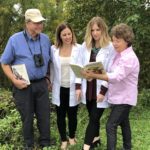
Birding again is a joy with hearing aids, thanks to Heartland Hearing
by Marion Patterson | Oct 18, 2018 | Travel/Columns
Connections
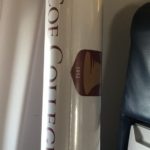
Poster by Coe Student
It’s amazing how many connections you will find when you travel to Alaska. My winter journey started with a fine chat with a Coe College student headed to the Twin Cities for a physics presentation. As a Coe grad, I was excited to hear about his work and know some of the professors I have long admired.
From Minnesota to Anchorage I visited with several X-C skiers taking part in the Tour of Anchorage and actually caught a glimpse of them on the trail later.
We literally bumped into Iowa State fans while walking to the Ceremonial Start to the Iditarod.
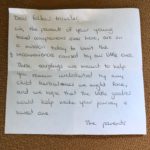
Thoughtful note from a parent.
On the way back I found on my seat a sweet note from a fellow traveler apologizing in advance and a few “goodies” in a small bag. How thoughtful! And, the infant was quiet most of the way, fussing only briefly.
Since my trip March 2017, I’ve met three people bound for Alaska, visited with a half dozen who plan to go there, and many who have traveled and are eager to share their adventures.
Tips
Alaska offers so much each season so check out the Alaska websites of the areas you plan to visit.
Winter or Summer Solstice events abound, and you will want to take them in.
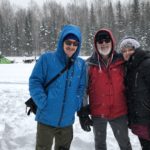
Brain Ohlen, David and Brenda Hack of Alaska. Skhoops keep legs warm in winter.
Clothing: No matter the season you visit, plan for the varied weather in Alaska that can range from bitter cold to balmy days. In winter everyone really knows how to dress to stay warm and be able to move. A great innovation is skhoops which are insulated skirts. They come in varied lengths and women slip them on over their office clothing when they go out for short walks. They sure are handy for long times outside as an added layer against the cold and they allow movement!
Alaska towns have all sorts of indoor activities like concerts and even in the sophisticated venues, dress ranges from nice casual to formal.
Everyone knows how to keep the feet warm with well insulated, waterproof, and comfy boots.
All sorts of hats are the rage no matter the season. In winter people cover their faces and in summer they shield themselves from the sun, wind, and bugs.
Money
Alaska is expensive so make sure your credit card is up to date and bring cash. Some places take only cash.
Lodging
Visitors have a range of choices for lodging. Some stay with friends. Others use hostels and hotels and motels. Airbnbs are popular. Some folks like bed and breakfasts and lodges because they interact with locals. Lodges in Alaska are different from bed and breakfasts. So, check out what is included in the price.
Food
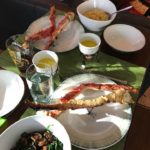
Great meals in Alaska
Just like the lower 48, Alaska has its food trucks with tasty treats for those on the go at festivals. Cafés have lovely choices and attentive servers. Breweries are all the rage in Alaska. Perhaps one of the most elegant restaurants in the Anchorage area is the Crow’s Nest perched atop the Captain Cook Hotel downtown. It is a testament to the resiliency of Alaskans as it was part of the renovation of Anchorage after the 1964 9.2 Good Friday earthquake that leveled much of the city.
One Alaska suggested for visitors to get in shape for walking, skiing, hiking and fat tire biking which is a terrific way to get around in winter as well as summer. Alaska is wild. So, stay within your limits and have a guide for those out-of-the-way trips.
Alaska in any season offers up a wonderful adventure. Consider winter when bugs and bears are sleeping and food and festivals abound.
-

-
All sorts of hats appear.
-
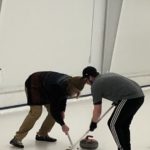
-
Scrubbing the ice.
-

-
A dog sled handler dressed up.
-
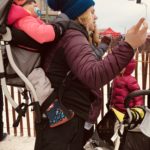
-
Cheering on the Iditarod
-
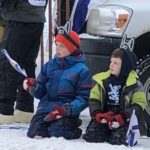
-
People know how to dress to enjoy Alaska outdoors.
-
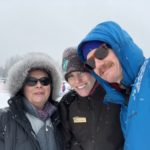
-
At the Iditarod Start
